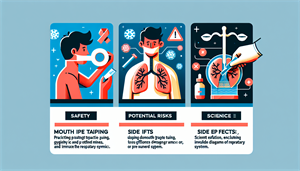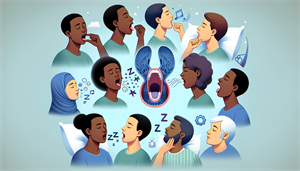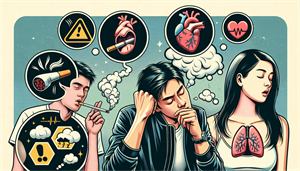
Is Mouth Taping Safe?
Has the internet’s latest sleep hack caught your eye? The trend of mouth taping is turning heads and raising eyebrows. Let’s delve into the world of mouth taping to separate myths from facts and uncover the truth about this controversial sleep strategy: is mouth taping safe?
Key Takeaways
-
Mouth taping is practiced to promote nasal breathing during sleep, with the intention of improving sleep quality, reducing snoring, and increased oxygen intake, but should be done correctly using hypoallergenic tape to allow for safety.
-
Existing studies on mouth taping show benefits such as reduced snoring for individuals with mild sleep apnea, but more research is required to validate its overall effectiveness, and it’s not a solution for apnea episodes.
-
Mouth taping carries risks like skin irritation and breathing difficulties, especially for those with respiratory conditions.
-
Alternative methods for better sleep include side sleeping, nasal strips, and managing allergies or asthma, and consultation with a sleep specialist is highly recommended before trying any sleep improvement techniques.
Understanding Mouth Taping
Mouth taping, as the name suggests, involves sealing the mouth shut during sleep. But why would anyone want to tape their mouths shut? The objective is simple - to encourage nose breathing. Nose breathing has several advantages over mouth breathing. The air we breathe through our nose is not just ordinary air. It’s heated, humidified, and filtered, which can reduce snoring and trigger our body’s stress-reducing parasympathetic nervous system.
If mouth taping piques your curiosity and you’re thinking of giving it a shot, make sure you do it correctly. Use a narrow piece of gentle hypoallergenic elastic mouth tape and apply it vertically. This method allows for some mouth movement and ensures a passage of air if necessary. So what are the potential benefits?
Improved nasal breathing Reduced snoring Increased oxygen intake Improved sleep quality Give mouth taping a try and see if it works for you, especially if you tend to sleep with your mouth open! Mouth taping can reduce mouth breathing, snoring, and promote nose breathing, enhancing your sleep quality and potentially addressing bad breath issues often associated with mouth breathers.
The Science Behind Mouth Taping
Research on mouth taping is in its infancy, and the limited studies available show varied outcomes. Some studies have found a reduction in snoring intensity, but more rigorous and extensive clinical trials are needed to determine its overall effectiveness.
It’s always a good idea to consult a sleep medicine specialist for personalized advice. A 2022 study found that individuals with mild sleep apnea, a less severe form of obstructive sleep apnea, who taped their mouths experienced reduced snoring intensity compared to nights without taping. A similar finding was reported in a 2015 pilot study. However, keep in mind that mouth taping didn’t successfully avert apnea episodes. Individuals still exhibited ‘mouth-puffing’ to restore breathing after an apnea episode.
Potential Risks of Mouth Taping
Mouth taping comes with its own set of risks. Skin irritation is one of the most common concerns. Allergic reactions, rashes, and general skin irritation may occur, particularly in individuals with sensitive skin. Beyond skin reactions, there are potential respiratory risks. These include difficulty breathing and the worsening of conditions like sleep apnea.
Suffocation Concerns
While the risk of suffocation from mouth taping is low, it can lead to difficulty in breathing, especially for those with existing respiratory issues. If you have a pre-existing respiratory condition like sleep apnea or asthma, mouth taping can potentially worsen your symptoms, making it particularly risky.
When to Consider Mouth Taping
One should not use mouth taping as a replacement for professional medical advice. It’s important to consult a healthcare professional, especially if you have underlying health conditions. Mouth taping may not be suitable for everyone, and it’s crucial to weigh the potential benefits against the risks before trying this sleep strategy.


